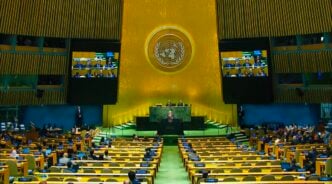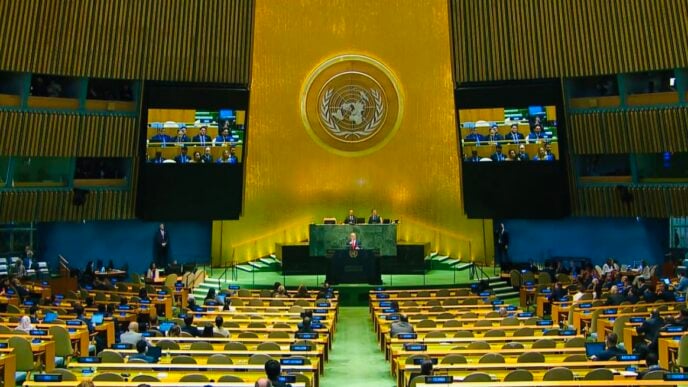BY NELSON OKWONNA
The gap between the rich and poor is widening across the world; from USA to Europe, from Asia to Africa, the story is the same.
For example, data from the World Inequality Database shows that share of national income for the top 10% in the United Kingdom grew from 28.5% to 39.5%, while that of the bottom 50% decreased from 23.5% to 20% (1980-2023). In the same period in the USA, the share by the top 10% grew from 10.8% to 20.7%; while the share of the bottom 50% dropped from 20.9% to 13.4%. In Nigeria, the situation is far more acute, 2023 data indicates that the top 10% holds 42.1%, while the bottom 50% holds 16.7% of national income.
The reason is not difficult to see. For over fifty years, assets — land, property, equities, enterprises — have grown in value faster than wages. Owners of these assets enjoy compounding wealth, while those who rely only on their labour fall behind.
Advertisement
Thomas Piketty popularised this idea in Capital in the Twenty-First Century; he noted that when the return on capital (r) consistently exceeds the growth of the economy (g), inequality widens because wealth compounds faster than wages.
To give case studies, we can compare the growth of real estate prices with wages; for example, in Abuja, Nigeria’s federal capital, the purchasing price of well-located apartments have risen by an average of 4X between 2020 and 2025; the wage of professionals like doctors have not risen by 3X within the same period, despite increase in the capacity of the wage. Hence, the absolute purchase capacity of an average wage owner has been severely depreciated over the past five years.
An IMF study on why labour share of GDP has been dropping over the past 45 years, identified globalisation and technology as factors weakening the bargaining power of labour in advanced economies. Wages have grown slower than productivity in many industries. Union decline in Europe and the US has meant fewer collective wage gains. Precarious “gig economy” and contract work exacerbate this stagnation, reducing long-term wealth building for workers.
Advertisement
GOVERNMENT POLICIES HAVE AIDED THIS DEVELOPMENT
Expansionist monetary policies (low interest rates, quantitative easing, fiscal stimulus) were ostensibly designed to prevent stagnation, but they primarily inflated asset prices rather than wages. Cheap capital disproportionately favours those who already own assets or can borrow to acquire them. In effect, central bank policies — though intended to stabilise economies — have entrenched inequality.
In developing countries like Nigeria, the pattern is even starker: A small elite holds assets (land, oil blocks, stocks, real estate) and captures government spending or credit. The masses rely on wages in the informal economy, which are stagnant and often eroded by a run-away inflation. Weak property rights and limited access to credit make it nearly impossible for workers to transition into asset ownership.
There is also another challenge – the prevailing consumerism culture driven by asset-owning elites often nudges workers to spend their earnings rather than save or invest.
Advertisement
Scholars have long observed the imbalance. Besides Thomas Piketty’s argument that returns on capital outpacing growth inevitably entrenches inequality; Milton Friedman pointed to the unintended upward redistribution created by expansionary government policies. Elinor Ostrom highlighted how communities can manage resources more fairly.
What this author invites the reader to ponder on is, how do we enable ordinary households to own productive assets?
PLEASE DO NOT SAY TAX!
Progressive taxation and welfare redistribution, the usual solutions, rarely change this. They may ease immediate poverty, but they do not transfer ownership. Yes, welfare equalises consumption; it does not seed wealth generating capacity; it has no effect on the prevailing structure. As a result, inequality hardens across generations; and worse still, could deprive the beneficiary of the welfare from the incentive to engage the marketplace. Another challenge with taxation is that it relies too much on the government, on politicians to be precise, with a habitual tendency to maintain budget deficits and to spend via channels already captured by the current asset owners.
Advertisement
The greater challenge, however, lies not in just designing mechanisms but in cultivating leaders with the heart to champion them. Fairer ownership demands moral conviction. Without it, even the best-designed reforms become tools of the powerful. With all the progressive taxation policies of the West, the inequalities have not only persisted, but it has also rallied.
HERE, BIBLICAL WISDOM IS STRIKINGLY RELEVANT
Advertisement
The law of Jubilee required that land eventually return to its family owners, preventing permanent dispossession. The sabbath year gave the land rest, reminding society not to extract endlessly. Farmers were commanded not to reap their fields to the edges but to leave margins for the poor, so that dignity and sustenance were preserved without dependence. These principles did not create dependency; they do not centralise asset ownership or dispossess the diligent, rather they created opportunity and balance.
There are two levels we can consider in approaching a solution – the first is what policy makers can do, the other is what business leaders should consider.
Advertisement
At a policy level, let us take a case study of the MSME sector in Nigeria, the sector employs more than 85% of Nigeria and receives less than 2% of the banking sector credit to the private sector (CBN Bulletin, 2024).
MSMEs often do not have securitise-able assets; smallholder farmers do not have bankable land titles; automobile mechanics do not own decent workshops with valid C of O; more than 80% of land titles owned by Nigerians are not bankable.
Advertisement
The result is that financing this sector is difficult but this can be changed by design.
At an intra-firm level, there is a greater need for fair-minded CEOs to begin to benchmark labour income growth rate (g) with firm productivity growth rate (r), considering the fact that left to its devices, labour is unlikely to effectively negotiate sufficiently under prevailing conditions.
Some possibilities include:
● Increased supply of bankable titles: State governments should lead efforts to ensure MSMEs and households have bankable land and property titles as these are critical for accessing credit and building generational wealth transfer and investment. (Think titles for farms, cooperative farms, mechanic workshops in artisanal villages, community flea markets, tailoring parks etc).
Nigeria has done a good job in supplying market spaces (bankable assets) to traders. We need to do more for other non-trading micro and small enterprises. For example, more than 95% of automobile mechanics in Nigeria (there are more than 100,000 of them) do not have legal titles to their workshops and would definitely have their operational base relocated after 10-20 years of operating in a particular location due to city renewal plans that didn’t capture the mechanic workshop/cluster in the initial urban plan.
● Accessible, de-risked credit for business assets: Low-cost financing directed to commercial property, productive equipment, housing and small enterprises, insulated from speculative or consumptive use. It is easier for an automobile mechanic to access credit to finance better equipment if he owns or has a mortgage on his workshop, thereby increasing competitiveness and productivity.
● Scale of contributory pension schemes/wage-to-asset conversion systems: Policy makers to incentivise and further promote automatic mechanisms that channel a portion of wages into pooled investment funds, supported by matching contributions.
● Cooperative producers, processor equity schemes: This is particularly relevant in the farming and mining sector, active promotion of equity schemes that allow producers organised in cooperatives or trust groups to own stakes in processing facilities that take their outputs to the market.
● Citizen wealth accounts: Countries like Norway use their oil revenues to build a national wealth fund where citizens benefit from the returns. A similar idea could give every citizen a small share in national resources or infrastructure projects. (Imagine if NNPC bought 30% of Dangote Refinery and every tax paying Nigerian entity got a share).
● Affordable path to home ownership: In Singapore, the Housing Development Board has made it possible for most families to own their homes through government-backed schemes. Rent-to-own and housing cooperatives can help renters gradually become owners instead of paying rent forever.
● Teach saving and investment early: In Japan, schools emphasise saving and responsibility from childhood. Communities, churches, and the media can play the same role, shifting culture from endless spending to saving and investment. Also, government can offer tax rebate to employees investing in pension schemes or other similar schemes.
● Profit-sharing workplaces: In the UK and US, employee share ownership plans (ESOPs), which allows workers to own a piece of the company. When the business does well, workers benefit too — not just the top shareholders. Government policies can be designed to incentivise this.
These measures embody the biblical spirit of leaving margins, respecting sabbath, and ensuring that wealth circulates rather than concentrates. They do not demand that the wealthy lose everything, but that society builds pathways for others to rise. We do not need bigger welfare states, we need broader ownership of productive assets.
The world’s inequality crisis is not simply an economic puzzle; it is a moral one. Policies can be designed, but only leaders with courage and conscience can ensure they serve the common good. The scriptures remind us that land, labour, and capital ultimately belong to God, and human stewardship must reflect justice. Unless we recover both the wisdom and the heart, the divide between rich and poor will not only persist — it will deepen.
Okwonna is the CEO of Octoville Development Company and co-convener of Abuja Business as Mission bi-annual conferences.
Views expressed by contributors are strictly personal and not of TheCable.









